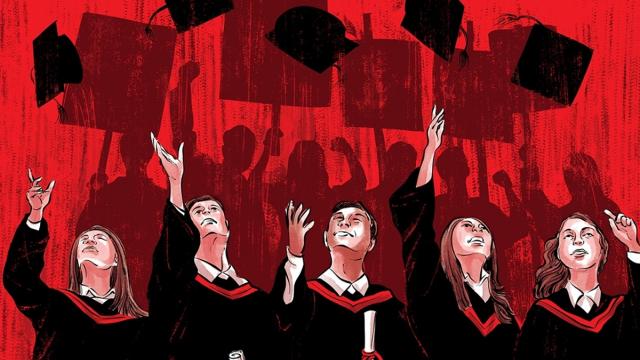
This is the third of three article installments on debtors' unions that ran this week. Read the first and second parts here.
Getting Organized
For-profit schools are notorious for running afoul of the law. Corinthian Colleges Inc., once the nation’s largest for-profit educational chain, was no exception. The company has been accused of fraud and predatory lending by everyone from Attorneys General to the CFPB, gaming the federal student loan system to the tune of $1.4 billion in federal grant and loan dollars in 2010 alone, more than the ten University of California campuses combined for that same year.
As Corinthian’s many scandals grew increasingly public in the summer of 2014, a small group of former students had already begun to organize. Collaborating with these students, and enrolling technology experts and lawyers daring enough to take us seriously, we began to work closely with a group of 15 former Corinthian students who were ready to publicly declare their refusal to make any more payments on their federal student loans.
To broaden the reach of this action to all current and former Corinthian students, including those who would choose not to join the strike, we also put together an online legal tool (via what was then a little-known provision in the Higher Education Act known as Defense to Repayment) that allowed students to challenge their debts with the Department of Education.
In February of 2015, after an intensive retreat with the strikers that included legal advice, story sharing, and media training, the Corinthian 15 went public with their history-making strike. Requests to join the strike poured in from current and former Corinthian students across the country.
Rather than merely mark down all of the thousands who wanted to join, we made sure that each potential striker understood the potential consequences of their act—a trashed credit score, wage garnishment, tax return garnishment, social security garnishment—phone call by phone call. Soon the strike had grown to 200 students, and their demand for debt cancellation had been endorsed by politicians and labor unions alike.
With the Corinthian 200 as our pilot union, we have begun to expand outward to other for-profit colleges working on the same model, including ITT Tech and Art Institutes. Organizing debtors is complex, and the barriers to organizing debtors’ unions are high. There are no shared factory floors. People in debt to the same institution are often geographically remote and disconnected from one another.
Many debtors don’t know who profits when they pay their debts, or who stands to lose if they don’t. Debtors struggle to distinguish originators, aggregators, guarantors, and servicers. For instance, most student debtors think they have Sallie Mae loans because Sallie Mae is their servicer. But many are actually in debt to Citibank, Chase, Deutsche or the Department of Education. And of course, once our student loans are pooled and tranched into asset-backed securities, their owners are dispersed further still.
To build collective power in these conditions, we know that we must work towards understanding Wall Street’s role in mass indebtedness. That is to say that we must politicize the bond market.
As public institutions like the University of California effectively take orders from Moody’s bond rating agency, we must ask: what is the effect on secondary markets of the Federal guarantee of student loans? Who is profiting from student loans? Who is profiting from unsustainable mortgage markets? Who is profiting from municipal debt that wreaks havoc on our communities?
When we can leverage the credible threat of collective, targeted non-payment over banks, when we can force the bond market to take losses, then we will have realized the power of debtors’ unions.
As the Corinthian debt strikers continue to press their demands, we know that re-envisioning higher education is only the beginning of what debtors’ unions can do. Imagine the power of mortgage-debtors’ unions to leverage eminent domain to halt foreclosures, or criminal justice debtors-unions gumming up the works of the debt-to-prison pipeline from Ferguson to Los Angeles.
Debtors’ unions can change the spaces of possibility across the unequal landscapes of contemporary capitalism. But only on-the-ground organizing, with all its challenges and imperfections, can make such action possible. Most of this work has never been done before, so a willingness to experiment is in order.
Experimentation With Debt
We see this sort of experimentation-with-debt as complementary to other forms of collective resistance. Debt, after all, is a claim on future wages. As Fight for $15 movements triumph across the country there is little solace to be had if the cost of housing and education continues to skyrocket. A substantial portion of union wages go towards repaying consumer debts, to say nothing of the relationship between massive union pension funds and their role in the financial system. In other words, debt, wages and benefits are intertwined under finance capitalism, and need to be addressed together.
In a way we find exciting, debt organizing and labor organizing have different targets, and thus different (and again, complementary) potential outcomes. Labor organizing targets the employer, workplace regulation and the means of distributing corporate surplus. The workplace’s economic role in a worker’s life is the payment of wages and benefits, so labor organizing naturally focuses on how we (don’t) get paid.
Debt organizing, on the other hand, targets the creditor, the regulation of lending and the means of financing the good or service in question. Thus, debt organizing naturally focuses on how and by whom things we care about (education, healthcare, housing) are paid for. This means that debtors’ unions are not simply renegotiating debt but also forcing open questions that the era of finance seems to have foreclosed: how do we even pay for things in the first place?
The challenge is to build a politicized class of debtors who go beyond particular victories toward collective power writ large. One outcome of successful organizing could, of course, be a debt jubilee—perhaps better called a “fast bailout” in which bondholders take deep losses and the slate is wiped relatively clean. But we cannot stop there. A major debt jubilee would be a significant victory, but only if it was coupled with a deep, durable shift in the distribution of political and economic power.
With this shift, both creditors and debtors would negotiate the terms of every contract, and, indeed, produce a world in which indebtedness is no longer required to finance life’s most basic needs. Were a jubilee to occur as a “benevolent gift” from creditors to debtors, without an accompanying power shift, crises of indebtedness would continue indefinitely because debtors would remain without a seat at the bargaining table. Moreover, if jubilee were to occur without a substantive reimagining of our economic system, and a collective reckoning with the way debt is and has been used as a mechanism of social control, we will have gained little.
What this new economic system might look like—the ways it would use socially productive forms of debt and credit, the ways it might enable a truly democratic society—remain to be seen. What we know is that debtors’ unions could give us a timely tactic through which to build collective power—and it is only through collective power that we will be able to answer these questions for the first time.
Find out more about the Debt Collective, which leverages collective power by offering debtors a shared platform for organization, advocacy, and direct action.
3 WAYS TO SHOW YOUR SUPPORT
- Log in to post comments














